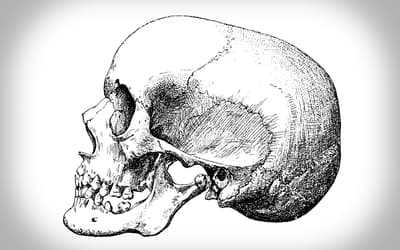Professional, peer-reviewed papers about theistic evolution (also known as “evolutionary creation”) from the perspective of a biblical, recent-creation framework.

Theistic Evolution: A Response to Wayne Grudem, Making the Same Errors He Opposes in Others
Dr. Terry Mortenson • Feb. 17, 2021
Grudem is making the same biblical and theological errors that theistic evolutionists make. To be biblically consistent, he must abandon his old-earth position.

The Grand Canyon, Monument to an Ancient Earth: The Deceptions Continue
Dr. Terry Mortenson • Dec. 2, 2020
The Grand Canyon, Monument to Ancient Earth? rejects the truth of Genesis regarding the Flood and the age of the earth.

Inerrancy and Biblical Authority: How and Why Old-Earth Inerrantists Are Unintentionally Undermining Inerrancy
Dr. Terry Mortenson • Sept. 16, 2020
The old-earth signers of the CSBInerrancy unintentionally violated their own principles of interpretation and unintentionally undermined the inerrancy and the authority of Scripture.

Lithostratigraphic Correlation of the Coconino Sandstone and a Global Survey of Permian “Eolian” Sandstones: Implications for Flood Geology
Dr. John H. Whitmore • Oct. 23, 2019
The cross-bedded Coconino Sandstone (lower Permian, Arizona) is often used as a “type” ancient eolian sandstone.

Critical Analysis of Hugh Ross’ Progressive Day-Age Creationism Through the Framework of Young-Earth Creationism
David Mcgee • Feb. 13, 2019
The most important part of the debate between views on creationism is about the presuppositions of each group and their biblical hermeneutics.

Challenging the BioLogos Claim that a Vitellogenin (Egg-Laying) Pseudogene Exists in the Human Genome
Jeffrey P. Tomkins • Oct. 21, 2015
Interestingly, BioLogos is probably the only evolutionary group that puts such a high level of focus on this hypothesis as key evidence for evolution.

Documented Anomaly in Recent Versions of the BLASTN Algorithm and a Complete Reanalysis of Chimpanzee and Human Genome-Wide DNA Similarity Using Nucmer and LASTZ
Jeffrey P. Tomkins • Oct. 7, 2015
Past evolutionary research in comparative DNA analysis between chimps and humans has employed a great deal of preferential and selective data analysis.

The Lost World of Adam and Eve: A Response
Steve Ham • July 29, 2015
This paper contends that Walton has given a magisterial authority to the ANE mythic texts in order to interpret the Genesis accounts.

A Review of Hugh Ross’ Latest Book, Navigating Genesis
Dr. Danny R. Faulkner • April 15, 2015
While many Christians support Ross’ broad conclusions, few would agree with the details of Dr. Ross’ argument.

Physical Difficulties with Hugh Ross’ Local Flood Model
Dr. Danny R. Faulkner • April 15, 2015
There are at least three problems with Hugh Ross’ local flood model which render it physically impossible. This is in addition to numerous biblical issues.

A Reply to Bruce Gordon’s Biblical Critique of Young-Earth Creationism
Ashby L. Camp • Jan. 28, 2015
Dr. Gordon recently published a critique of the claims of young-earth creation. This reply is to the biblical criticisms in his paper.

Circular Reasoning in the Dating of Deep Seafloor Sediments and Ice Cores: The Orbital Tuning Method
Dr. Jake Hebert • Aug. 27, 2014
The different dating systems are calibrated to one another: dates assigned to the seafloor sediments are used to date the ice cores, and vice versa.

Jesus, Scripture and Error: An Implication of Theistic Evolution
Simon Turpin • Oct. 30, 2013
The very teachings of Jesus are being attacked by those who state that, because of His human nature, there is error in some of His teaching regarding earthly things such as creation.

A Response to Peter Enns’s Attack on Biblical Creationism
Lee Anderson, Jr. • April 17, 2013
This paper overviews the recent work of Peter Enns, The Evolution of Adam.

Did Death of Any Kind Exist Before the Fall?
Simon Turpin • April 3, 2013
Death, whether animal or human, physical or spiritual, is a consequence of man’s disobedience toward his Creator and an intrusion into His “very good” creation.

Evangelical Commentaries on the Days of Creation in Genesis One
Simon Turpin • March 20, 2013
This paper will evaluate and critique six commentaries and the reasons they give for not taking the days of creation literally.

Is Young-Earth Creationism a Bad Choice?
Callie Joubert • Nov. 14, 2012
Any understanding of Scripture that excludes or indicts the divine Himself is necessarily flawed and false.

The Unbeliever at War with God: Michael Ruse and the Creation-Evolution Controversy
Callie Joubert • Sept. 5, 2012
The evidence to be considered will indicate that a fear of God and afterlife play a major role in the psychology of unbelief, and that points toward the realism of Scripture.

Theistic Evolution: An Incoherent and Inconsistent Worldview?
Callie Joubert • July 11, 2012
Christians are caught up in theistic evolutionism without realizing that the worldview of theistic evolutionism is incoherent and inconsistent with the teachings of Scripture.

An Examination of Augustine’s Commentaries on Genesis One and Their Implications on a Modern Theological Controversy
Dr. Tim Chaffey • July 13, 2011
Few individuals in church history are as popular as Augustine of Hippo. Old-earthers claim him as support for figurative interpretations of Genesis 1. But what did Augustine really say?

Baraminological Analysis Places Homo habilis, Homo rudolfensis, and Australopithecus sediba in the Human Holobaramin: Discussion
Dr. David A. DeWitt , et. al. • Aug. 25, 2010
A discussion on a previous ARJ paper in regard to Australopithecus sediba and its classification.

Systematic Theology Texts and the Age of the Earth
Dr. Terry Mortenson • Dec. 16, 2009
In the past few decades there has been a growing controversy in society and in the Church over evolution and the age of the earth.
Theistic Evolution on Answers Research Journal
Theistic evolution (or evolutionary creation) has been embraced by many professing Christians. When most people hear the word “evolution,” they think of biological evolution (i.e., neo-Darwinian evolution). But actually, evolution is a three-part theory to explain the origin of everything, both living and non-living things, by time plus chance plus the laws of nature (e.g., the laws of physics, chemistry, and genetics). So, we have cosmological evolution (to explain the origin of stars, galaxies, planets, comets, etc.), geological evolution (to explain the origin of the earth, rock layers, fossils, and topography), and biological evolution (to explain the origin of living things: microbes, plants, animals, and people). Rejecting atheistic evolution, theistic evolution is the view that God used time plus chance plus the laws of nature to create today’s universe and everything in it over the course of about 14 billion years. In this view, God either guided these physical processes in a way that cannot be detected by scientists, or He created the infinitesimally small “cosmic egg” and frontloaded it with the necessary conditions to expand and evolve into our present universe, as contended by the big bang theorists.
The primary account of the origin of the world is found in the Bible in Genesis 1–11. Both internal evidence in those chapters as well as the unanimous testimony of the rest of the Bible leads to the conclusion that Genesis 1–11 is historical narrative and should be interpreted in a straightforward way as any other historical narrative in the Bible. In these chapters, God clearly reveals how He created, when He created, and in what order He created things. He explicitly distinguishes His supernatural acts of creation (i.e., of the earth, sun, moon, stars, plants, animals, and the first two humans) from His acts of providentially upholding all that He created during the literal, six-day, creation week. He finished His creation at the end of that week and is not now creating but rather sustaining and sovereignly ruling over creation. He judged and in significant ways changed the whole creation when Adam and Eve sinned. He further judged the earth and living creatures with a global, catastrophic flood at the time of Noah, and judged humanity again at the tower of Babel by supernaturally making people speak different languages resulting in the division of the people into different nations or people groups.
ARJ authors evaluate the claims of theistic evolutionists in the light of this clear teaching of Genesis 1–11 and also in light of the Bible’s teaching about the character God, His declared purposes in His creation, His work of redemption, and the future destiny of the creation.
The aim of these research papers in the Answers Research Journal (ARJ) is to carefully examine various aspects of theistic evolution or the view as a whole in the light of biblical teaching as well as scientific evidence from astronomy, geology, biology, and anthropology.
